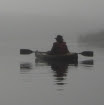There is a story of a man passing by a building site, and asking one of the workers what he was doing. "I am laying bricks," the worker replied, without looking up from his monotonous task. The passerby walked on and asked a second worker what he was doing. "I am building a wall," he replied, with a wave of his trowel as if to say the answer was obvious. The passerby continued a few more steps, and asked a third worker what he was doing. This man straightened up, gazed into the air above the growing foundation, spread his arms wide and declared, "I am building a great cathedral!"
When I was young and ambitious, eager to mold the world to my beneficent dreams, I heard that story with delight.
Later, weary with searching, I heard another story less frequently told. I wish I could remember who told it, or tell it as richly as they did.
There was a long road through wild and desert land. One night a small band of travellers came trudging, their waterskins empty, their lips cracked and dry. As darkness came upon them with nothing but dust and dry rocks in sight, they sank down by the side of the road in despair. But one of their number walked apart, unwilling to simply watch and endure this suffering.
After a time, as the shadows deepened, one stone seemed to draw him. He crossed to it, touching its rough surface, stretching out his arms to encircle it, and finally tugging on it, harder and harder. "I am mad with thirst," he thought. "Even if I move it, what will I find but more dust? Perhaps when it yields, it will roll and crush me." And still he tugged, and at last it seemed to him that the rock had shifted. He braced himself better, and with a mighty effort, he rolled back the stone and revealed a spring of water.
As the years passed, many travellers stopped at that spring to cool their throats and fill their waterskins. Some stayed a while to clean it and build a stone basin where water could be gathered without muddying the source. Others gave thanks and passed quickly on.
Later, as fears darkened the minds of men, some thought that the spring was too precious a thing to be left so open to the sky, to the wild, and to all manner of people who passed by there. And so they built a shrine to shelter and protect it, and a dwelling nearby for those who would tend it. And they welcomed travellers, holding out a cup to them and filling their wineskins with a dipper.
Years passed, and the shrine was expanded and refined. Travellers gathered inside, bowing in gratitude and praise, listening to the sound of the water somewhere deep within, and finally taking a little sip before they journeyed on.
At last a great cathedral stood upon that spot, and those passing on the road would tell the story of how a spring of water once rose up from the stones in that place. Sometimes one of them would venture inside, and in the dying echoes at the end of a great hymn, he might catch his breath in wonder, imagining that he heard again the trickle of clear water.




